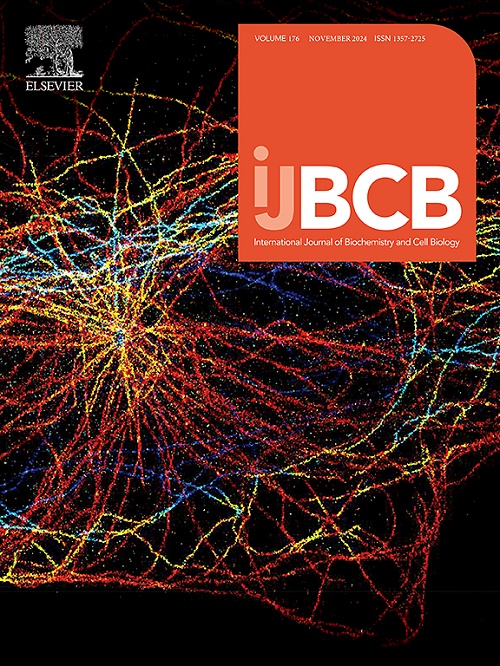Nuclear-localized SIRT1 inhibits apoptosis via deacetylating p53
IF 2.8
3区 生物学
Q2 BIOCHEMISTRY & MOLECULAR BIOLOGY
International Journal of Biochemistry & Cell Biology
Pub Date : 2025-08-05
DOI:10.1016/j.biocel.2025.106841
引用次数: 0
Abstract
The function of silencing information regulator 1 (SIRT1) in promoting or inhibiting apoptosis remains a subject of debate. Here, we aim to evaluate the roles of nuclear-localized SIRT1 in STS/DOX-induced apoptosis. Silencing nuclear-localized SIRT1 significantly enhanced STS/DOX-induced apoptosis, while overexpression of nuclear-localized SIRT1 markedly inhibited STS/DOX-induced process, demonstrating the anti-apoptotic ability of the nuclear-localized SIRT1. Critically, silencing p53 compromised the anti-apoptotic function of nuclear-localized SIRT1, thereby underscoring the essential role of p53 in mediating SIRT1's anti-apoptotic capability. Western blot analysis further revealed that wild-type SIRT1 robustly downregulated Ac-p53 expression to inhibit apoptosis, whereas a deacetylase-defective mutant of SIRT1 (SIRT1H363Y) markedly upregulated Ac-p53 to promote apoptosis. Fluorescence resonance energy transfer (FRET) analyses for the cells co-expressing nuclear-localized SIRT1-CFP and p53-YFP showed that STS enhanced the direct interaction between SIRT1 and p53 in nucleus, suggesting that the nuclear-localized SIRT1 directly interacts with p53 to deacetylate p53, thus inhibiting apoptosis. On the contrary,overexpression of cytoplasm-localized SIRT1 markedly promoted STS/DOX-induced apoptosis, firmly demonstrating the pro-apoptotic ability of the cytoplasm-localized SIRT1. These results firmly demonstrate a notion that nuclear-localized SIRT1 inhibits apoptosis via deacetylating p53.
核定位SIRT1通过去乙酰化p53抑制细胞凋亡。
沉默信息调控因子1 (SIRT1)在促进或抑制细胞凋亡中的作用仍然是一个有争议的话题。在这里,我们的目的是评估核定位SIRT1在STS/ dox诱导的细胞凋亡中的作用。沉默核定位SIRT1可显著增强STS/ dox诱导的细胞凋亡,而过表达核定位SIRT1可显著抑制STS/ dox诱导的细胞凋亡过程,表明核定位SIRT1具有抗凋亡能力。关键的是,沉默p53损害了核定位SIRT1的抗凋亡功能,从而强调了p53在介导SIRT1抗凋亡能力中的重要作用。Western blot分析进一步发现,野生型SIRT1显著下调Ac-p53表达抑制细胞凋亡,而SIRT1脱乙酰酶缺陷突变体(SIRT1H363Y)显著上调Ac-p53表达促进细胞凋亡。对核定位SIRT1- cfp和p53- yfp共表达细胞的荧光共振能量转移(FRET)分析显示,STS增强了SIRT1与细胞核内p53的直接相互作用,提示核定位SIRT1直接与p53相互作用,使p53去乙酰化,从而抑制细胞凋亡。相反,胞质定位的SIRT1过表达可显著促进STS/ dox诱导的细胞凋亡,充分证明胞质定位的SIRT1具有促凋亡能力。这些结果坚定地证明了核定位SIRT1通过去乙酰化p53抑制细胞凋亡的观点。
本文章由计算机程序翻译,如有差异,请以英文原文为准。
求助全文
约1分钟内获得全文
求助全文
来源期刊
CiteScore
8.10
自引率
0.00%
发文量
124
审稿时长
19 days
期刊介绍:
IJBCB publishes original research articles, invited reviews and in-focus articles in all areas of cell and molecular biology and biomedical research.
Topics of interest include, but are not limited to:
-Mechanistic studies of cells, cell organelles, sub-cellular molecular pathways and metabolism
-Novel insights into disease pathogenesis
-Nanotechnology with implication to biological and medical processes
-Genomics and bioinformatics

 求助内容:
求助内容: 应助结果提醒方式:
应助结果提醒方式:


